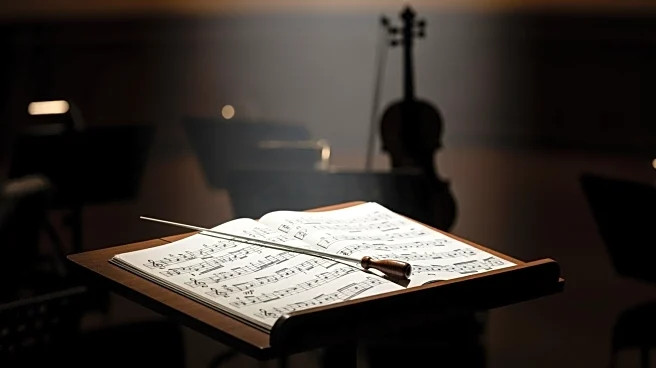What's Happening?
Alexander Shelley, the artistic and music director designate for the Pacific Symphony, is set to lead the orchestra in performances of Nikolai Rimsky-Korsakov's 'Scheherazade' at the Renée and Henry Segerstrom
Concert Hall. Shelley, who is succeeding Carl St.Clair, emphasizes the role of a conductor as a servant to the music, interpreting the works of composers for the audience. The concerts, scheduled from Thursday to Saturday, will also feature contemporary pieces such as Jessie Montgomery's 'Starburst' and Arturo Márquez's guitar concerto 'Mystical and Profane.' Shelley, who has been the music director of Canada's National Arts Centre Orchestra, views the performances as an opportunity to showcase the orchestra's talents and the beauty of the music.
Why It's Important?
The appointment of Alexander Shelley as the new leader of the Pacific Symphony marks a significant transition for the orchestra, potentially influencing its artistic direction and repertoire. Shelley's approach to conducting, which focuses on serving the music and fostering individual and collective excellence, could enhance the orchestra's performance quality and audience engagement. The inclusion of contemporary works alongside classical pieces in the program reflects a commitment to diverse musical offerings, which may attract a broader audience and enrich the cultural landscape of the region. Shelley's leadership is likely to impact the orchestra's reputation and its role in the community.
What's Next?
As Alexander Shelley takes on his new role, the Pacific Symphony may experience changes in its programming and artistic collaborations. Shelley's emphasis on individual and collective responsibility within the orchestra could lead to innovative performances and increased community involvement. The upcoming concerts serve as a preview of Shelley's vision for the orchestra, and future seasons may see expanded outreach efforts and educational initiatives. Stakeholders, including musicians, patrons, and local cultural organizations, will be watching closely to see how Shelley's leadership influences the orchestra's growth and impact.
Beyond the Headlines
Shelley's philosophy of conducting as a service to the music highlights the ethical dimension of leadership in the arts. His focus on empowering musicians to be their best selves while contributing to the collective performance mirrors broader societal aspirations for collaboration and excellence. This approach may inspire other cultural institutions to adopt similar values, fostering a more inclusive and dynamic arts community. Additionally, the integration of contemporary works into the symphony's repertoire could encourage dialogue about the evolution of classical music and its relevance in modern society.









